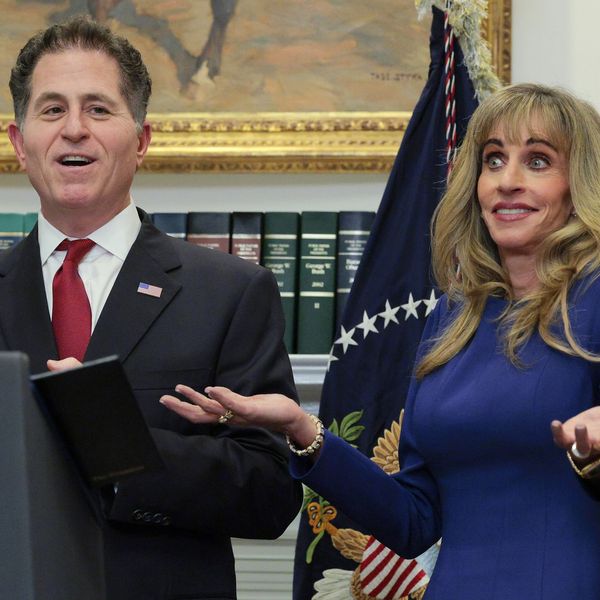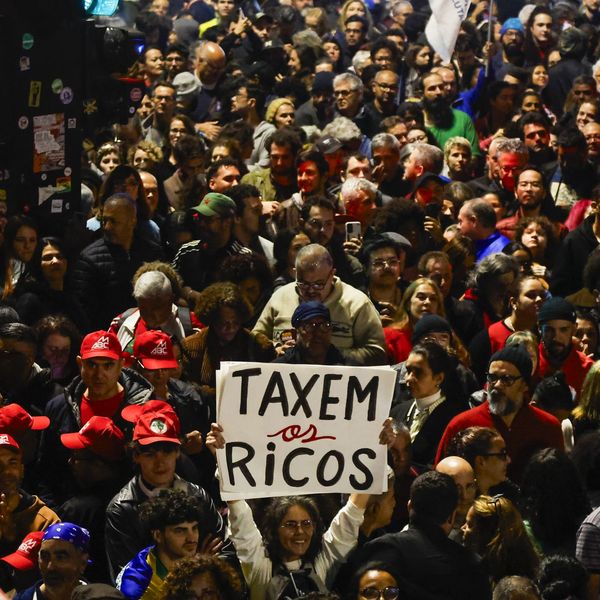Hard Times Hardly Hurt the Superrich
Forget the recession - there has never been a better time to be a member of that most exclusive of clubs: the ultrarich.

Forget the recession - there has never been a better time to be a member of that most exclusive of clubs: the ultrarich.
Yes, America's top 1 percent were hit hard by the economic crisis, accounting for half of income loss. Their share of U.S. income plunged from 23.5 percent to 18.1 percent. But in the sluggish recovery, top incomes have rebounded much more strongly. Economist Emmanuel Saez finds that in 2010, the top 1 percent captured 93 percent of income gains.
Two factors explain the vastly different recoveries of the rich and the rest. First, mass unemployment has devastated millions who rely on wages, but it has not directly affected the minority who live off their investments. Most of the wealth of the superrich takes the form of stocks, bonds, and other financial assets.
Second, the average American's most important asset is the home. And though the stock market has rebounded, 31 percent of U.S. homeowners were still "underwater" as of June. The burst housing bubble is the chief reason the median net worth of American families plummeted almost 40 percent from 2007 to 2010.
While the Federal Reserve and other agencies have stabilized and revived the financial sector and the stock market, political gridlock has blocked progress in writing off or restructuring the huge housing debt. The result? The wealth of average American families remains below its prerecession high.
What about the rest of the world? Data on the global rich are hard to come by. The information that is available, however, suggests a similar pattern worldwide.
In 2009, at the beginning of the recovery, the overall wealth of the world's 10 million millionaires and billionaires grew 18.9 percent, according to a report by Merrill Lynch and the Paris-based consultancy Capgemini. The wealth of this group had already approached its 2007 peak by the end of 2010. The world's top 1 percent held 44 percent of global wealth in 2010, according to Credit Suisse. That was up slightly from 2000, when the top 1 percent owned 40 percent of global assets, according to a the World Institute for Development Economics Research.
Meanwhile, the poorest half of the world's population - some 3.5 billion people - hold just under 1 percent of global wealth, and many are now staggering under the weight of rising food prices.
So perhaps it's no surprise that, even during a period of mass unemployment and despair in much of the industrialized world and slowing growth in China and other emerging economies, the world's wealthy are feeling great. Less than a quarter of the world's wealthy are pessimistic about their future prospects, according to the Knight Frank consultancy and Citi Private Bank. This year, respondents to Fidelity Investments' Millionaire Outlook were more optimistic about the future than in the previous five years.
Note, however, that a quarter of the millionaires consulted by Fidelity said they do not feel rich, but would if they only had $5 million more.
The rich really are different from the rest of us.
An Urgent Message From Our Co-Founder
Dear Common Dreams reader, The U.S. is on a fast track to authoritarianism like nothing I've ever seen. Meanwhile, corporate news outlets are utterly capitulating to Trump, twisting their coverage to avoid drawing his ire while lining up to stuff cash in his pockets. That's why I believe that Common Dreams is doing the best and most consequential reporting that we've ever done. Our small but mighty team is a progressive reporting powerhouse, covering the news every day that the corporate media never will. Our mission has always been simple: To inform. To inspire. And to ignite change for the common good. Now here's the key piece that I want all our readers to understand: None of this would be possible without your financial support. That's not just some fundraising cliche. It's the absolute and literal truth. We don't accept corporate advertising and never will. We don't have a paywall because we don't think people should be blocked from critical news based on their ability to pay. Everything we do is funded by the donations of readers like you. Will you donate now to help power the nonprofit, independent reporting of Common Dreams? Thank you for being a vital member of our community. Together, we can keep independent journalism alive when it’s needed most. - Craig Brown, Co-founder |

Forget the recession - there has never been a better time to be a member of that most exclusive of clubs: the ultrarich.
Yes, America's top 1 percent were hit hard by the economic crisis, accounting for half of income loss. Their share of U.S. income plunged from 23.5 percent to 18.1 percent. But in the sluggish recovery, top incomes have rebounded much more strongly. Economist Emmanuel Saez finds that in 2010, the top 1 percent captured 93 percent of income gains.
Two factors explain the vastly different recoveries of the rich and the rest. First, mass unemployment has devastated millions who rely on wages, but it has not directly affected the minority who live off their investments. Most of the wealth of the superrich takes the form of stocks, bonds, and other financial assets.
Second, the average American's most important asset is the home. And though the stock market has rebounded, 31 percent of U.S. homeowners were still "underwater" as of June. The burst housing bubble is the chief reason the median net worth of American families plummeted almost 40 percent from 2007 to 2010.
While the Federal Reserve and other agencies have stabilized and revived the financial sector and the stock market, political gridlock has blocked progress in writing off or restructuring the huge housing debt. The result? The wealth of average American families remains below its prerecession high.
What about the rest of the world? Data on the global rich are hard to come by. The information that is available, however, suggests a similar pattern worldwide.
In 2009, at the beginning of the recovery, the overall wealth of the world's 10 million millionaires and billionaires grew 18.9 percent, according to a report by Merrill Lynch and the Paris-based consultancy Capgemini. The wealth of this group had already approached its 2007 peak by the end of 2010. The world's top 1 percent held 44 percent of global wealth in 2010, according to Credit Suisse. That was up slightly from 2000, when the top 1 percent owned 40 percent of global assets, according to a the World Institute for Development Economics Research.
Meanwhile, the poorest half of the world's population - some 3.5 billion people - hold just under 1 percent of global wealth, and many are now staggering under the weight of rising food prices.
So perhaps it's no surprise that, even during a period of mass unemployment and despair in much of the industrialized world and slowing growth in China and other emerging economies, the world's wealthy are feeling great. Less than a quarter of the world's wealthy are pessimistic about their future prospects, according to the Knight Frank consultancy and Citi Private Bank. This year, respondents to Fidelity Investments' Millionaire Outlook were more optimistic about the future than in the previous five years.
Note, however, that a quarter of the millionaires consulted by Fidelity said they do not feel rich, but would if they only had $5 million more.
The rich really are different from the rest of us.

Forget the recession - there has never been a better time to be a member of that most exclusive of clubs: the ultrarich.
Yes, America's top 1 percent were hit hard by the economic crisis, accounting for half of income loss. Their share of U.S. income plunged from 23.5 percent to 18.1 percent. But in the sluggish recovery, top incomes have rebounded much more strongly. Economist Emmanuel Saez finds that in 2010, the top 1 percent captured 93 percent of income gains.
Two factors explain the vastly different recoveries of the rich and the rest. First, mass unemployment has devastated millions who rely on wages, but it has not directly affected the minority who live off their investments. Most of the wealth of the superrich takes the form of stocks, bonds, and other financial assets.
Second, the average American's most important asset is the home. And though the stock market has rebounded, 31 percent of U.S. homeowners were still "underwater" as of June. The burst housing bubble is the chief reason the median net worth of American families plummeted almost 40 percent from 2007 to 2010.
While the Federal Reserve and other agencies have stabilized and revived the financial sector and the stock market, political gridlock has blocked progress in writing off or restructuring the huge housing debt. The result? The wealth of average American families remains below its prerecession high.
What about the rest of the world? Data on the global rich are hard to come by. The information that is available, however, suggests a similar pattern worldwide.
In 2009, at the beginning of the recovery, the overall wealth of the world's 10 million millionaires and billionaires grew 18.9 percent, according to a report by Merrill Lynch and the Paris-based consultancy Capgemini. The wealth of this group had already approached its 2007 peak by the end of 2010. The world's top 1 percent held 44 percent of global wealth in 2010, according to Credit Suisse. That was up slightly from 2000, when the top 1 percent owned 40 percent of global assets, according to a the World Institute for Development Economics Research.
Meanwhile, the poorest half of the world's population - some 3.5 billion people - hold just under 1 percent of global wealth, and many are now staggering under the weight of rising food prices.
So perhaps it's no surprise that, even during a period of mass unemployment and despair in much of the industrialized world and slowing growth in China and other emerging economies, the world's wealthy are feeling great. Less than a quarter of the world's wealthy are pessimistic about their future prospects, according to the Knight Frank consultancy and Citi Private Bank. This year, respondents to Fidelity Investments' Millionaire Outlook were more optimistic about the future than in the previous five years.
Note, however, that a quarter of the millionaires consulted by Fidelity said they do not feel rich, but would if they only had $5 million more.
The rich really are different from the rest of us.

